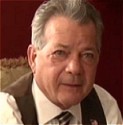Sen. David Vitter (R-LA) is set to introduce legislation to end so-called “birthright” citizenship. “Birthright” citizenship means anyone born on the soil of the United States is automatically granted U.S. citizenship.
Current citizenship laws stem from the wording of the 14th Amendment to the Constitution which states; “All persons born or naturalized in the United States, and subject to the jurisdiction thereof, are citizens of the United States and of the state wherein they reside.”
Among developed nations, only the U.S. and Canada still offer automatic citizenship to children born on their soil. Not a single European country follows the practice. We take this right for granted, but the evidence is that this entitlement encourages a booming birth tourism business (which undermines our immigration objectives) and virtually guarantees that the number of people in the country illegally will continue to grow.
As you may know, ICE agents recently raided 37 sites in California accused of hosting “birth tourism” where wealthy Chinese citizens would give birth in the U.S. so the child would be a citizen and could sponsor the parents and family for immigration later on.
According to a report from John Feere of the Center for Immigration Studies, admitting family members account for most of the nation’s growth in immigration levels. Of the 1,130,818 immigrants who were granted legal permanent residency in 2009, a total of 747,413 (or, 66 percent) were family-sponsored immigrants.
Vitter’s legislation would restrict citizenship to U.S. citizens or permanent resident aliens or those in the military. Right now, the government just hands out citizenship almost at random:
Astonishingly, the government, which Feere describes as being on “automatic pilot” on this issue, even gives passports to children born to foreign diplomats here – clearly people not “subject to the jurisdiction” of the U.S. When he followed up with the Social Security Administration on this question, he was told they knew the practice was inappropriate, but were not sure how to monitor it.




























